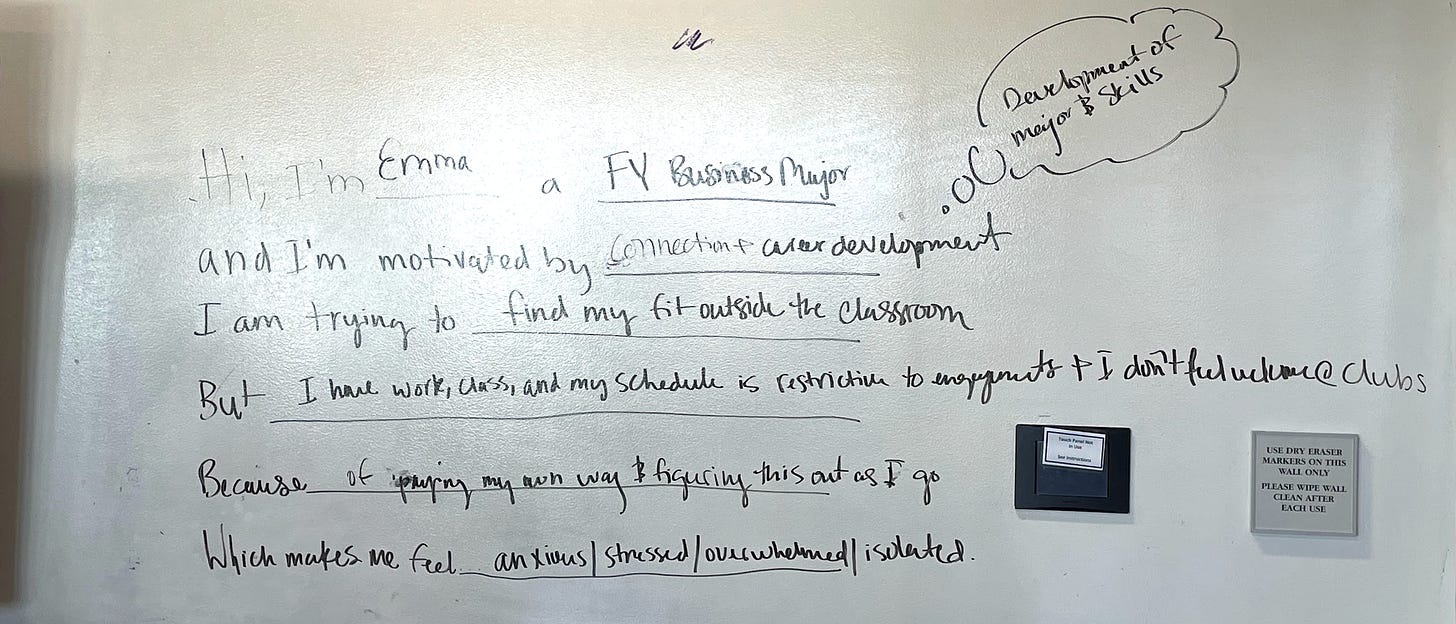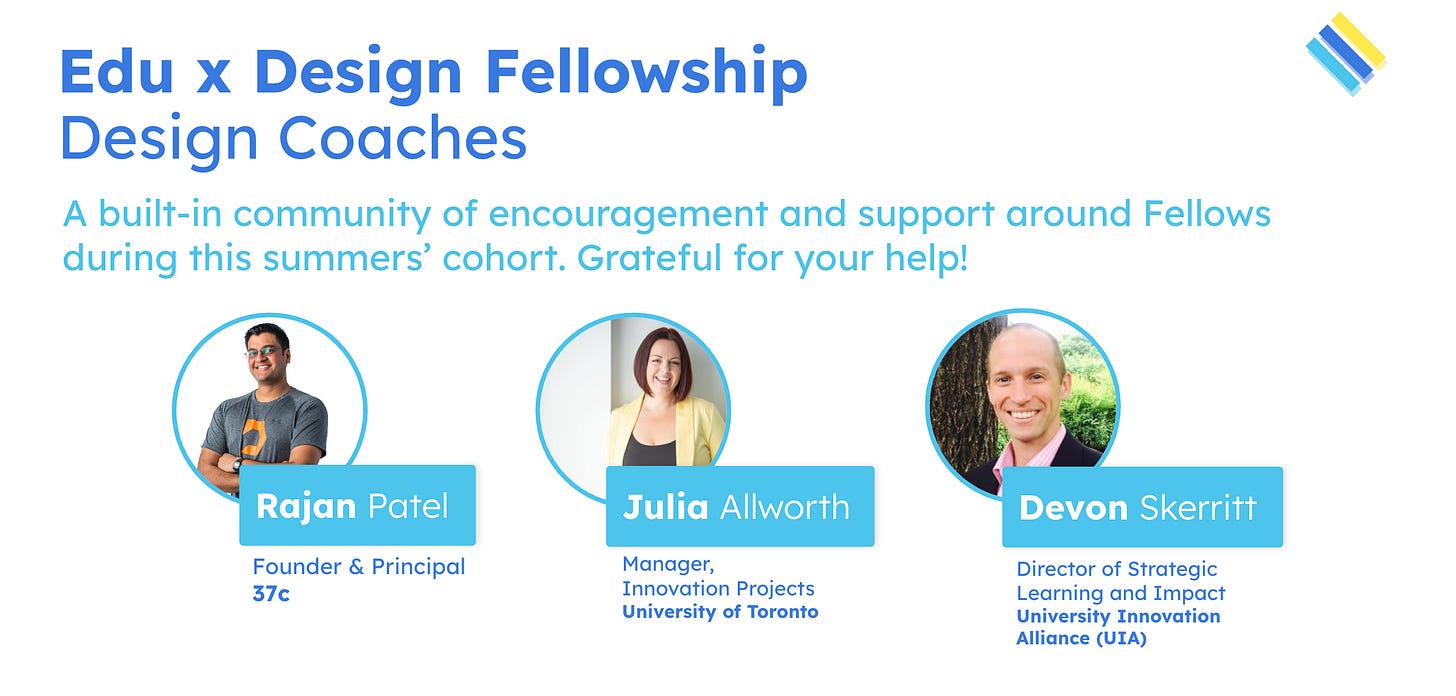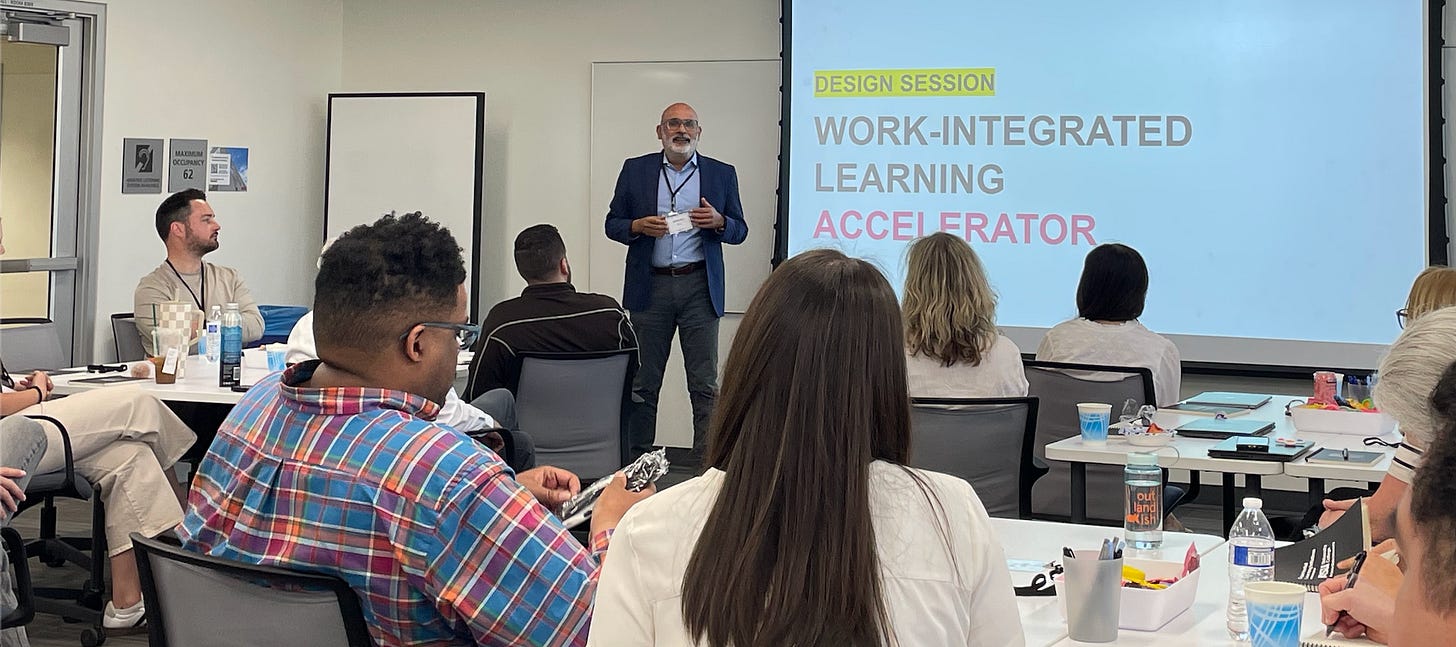Ready to make change in edu using design?
Opportunities and encouragement to put student-centered design into action
👋 Hi, thanks for reading.
I’m writing because education wasn't designed around students but we can improve the learner experience through design. I share stories, tips, and work in progress weekly.
Why it matters: These timely updates—from new fellowship coaches and WIL accelerator deadlines to podcast insights, field quotes, and teen innovation challenge wins—equip you to put human-centered design into action this week. Next up: Insights on student motivation and employer expectations—stay tuned for my deep-dive next week!
Go deeper:
After a week onsite convening employers, gathering community, and leading a design sprint for a new project team, there’s lots I’m learning to unpack in future posts.

Rather than rushing insights and synthesis around the challenges and dynamics of student career preparedness, motivation and engagement on campus, or employer perspectives on ‘ideal’ candidates and the skills for career success (stay tuned), I thought I’d share a few others updates this week to encourage you to take action.
I’m sharing a few bite size updates and pieces of encouragement to spend your time bringing design to life in your work: future opportunities, inspired listening, and words of encouragement to keep going!
Edu x Design Fellowship Design Coaches
This week I’m kicking off interviews with “Innovation Buddies” who submitted applications to the Edu x Design Fellowship.
To enhance the experience, I’ve recruited a set of volunteer “Design Coaches” to encourage and support Fellows through the experience. I’ll do the heavy lifting of communication, content development and delivery, but these three have so much wisdom and insight to share, fellows will win just by having them “in the room” (or Slack channel)!
Meet Rajan, Julia, and Devon. I’m so grateful for their support and partnership! I’m working on kicking off the cohort this summer, stay tuned for more updates.
ASU Work-Integrated Learning Accelerator Institute: Applications due this Friday
Learn alongside ASU, industry, and edtech partners to bridge the growing gap between higher education and workforce readiness in a cohort of peers ready to co-design stakeholder-centered solutions around work-integrated learning.
The National WIL Accelerator Institute is a multi-year effort launching in mid-2025 designed to bridge higher education, EdTech, workforce, and industry through co-design and implementation of multiple WIL pilots across the country. The vision is to transform education into a dynamic, cross-sector ecosystem that develops in-demand skills and redefines the learner experience.
The ASU WIL Institute is accepting applications from two- and four-year colleges and universities to join the inaugural cohort of the National WIL Accelerator.
Selected institutions will receive:
• Hands-on, tailored support and design sprint facilitation to co-develop new WIL models
• Resources and seed funding to support pilot development and implementation
• Participation in a national peer cohort working to expand access to work-integrated learning opportunities for all students
Learn more and apply by Friday, May 23
The team will also be accepting applications from EdTech companies and industry/workforce partners who are interested in tackling this grand challenge together.
I was honored to join the advisory group for this work after a serendipitous conversation during ASU-GSV and I couldn’t be more excited about what the team is putting together. There’s lots more exciting work to talk about here, stay tuned!
Podcast listening for your commute tomorrow
What happens when a faculty member, an innovation lab leader, and a human-centered design consultant get together to talk about design and higher education?
Dr. Stacy Neier Beran, Julia Allworth, and I got together last week on the Mindset in Motion podcast, thanks to Bill Heinrich for organizing and the invite. This was a fun conversation with smart, passionate folks invested in student learning and growth using design and experiential learning and covering topics ranging from project-based learning, to mindset and skills developed through the design process, to how to use design for change in higher education. I’d love to hear what you think!
Encouragement for Jacobs Teen Innovation Challenge participants (+ anyone building their design practice)
The Jacob Teen Innovation Challenge is a global virtual competition that empowers students aged 13-18 to become changemakers by using design thinking to develop innovative solutions to real-world problems. Aligned with the 17 United Nations Sustainable Development Goals (SDGs), this challenge encourages teens to tackle pressing social, economic, and environmental issues in their communities and beyond.
I served as a judge this year and reviewed 4 submissions from teams all over the world. I was so impressed by teams’ empathy, investigation and ingenuity meet the needs they identified, and especially loved their effective communication to share their process and ideas.
Judges were asked to submit a :15 second clip to celebrate the participants’ accomplishments in completing their design sprint and I hope they might encourage education leaders using design in your work (YOU!?):
Insights from the Field
Bringing you voices from across education to answer:
What advice would you give to someone driving change in education?
“In leading change within higher education, I’ve seen two common challenges that can be flipped to become tools for progress.
Humans aren’t wired for change - so reframe it.
Our brains seek safety, not change. Acknowledge that reality and reframe change as a strategic response to evolving student needs, revised stakeholder expectations, technology advances, shifts in funding models, and other important factors. This reframing gives those involved a path forward without feeling compelled to defend what was done in the past.We’re too busy - so create space.
Encourage those on work teams to focus on what they can stop doing to create space for innovation. Addition can be overwhelming, but subtractive improvement to remove barriers or eliminate cumbersome and lower-value tasks can be energizing. Why not make something better AND save time?Let’s go make some progress. “Progress is the spark that makes believers out of skeptics.” (Dan Heath)”
Stacey Bradley, University Organizational Excellence Officer, University of South Carolina
Learning is better when it’s social.
If this post moved something in you, tap the ❤️, pass it along, or join the conversation on LinkedIn—I’d love to hear what it sparked.





